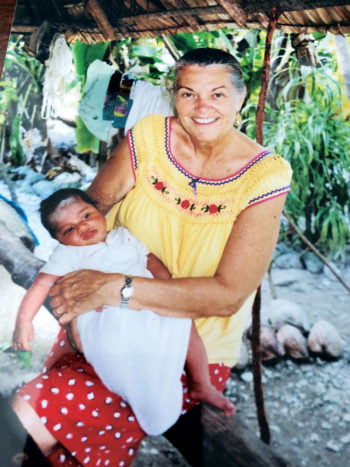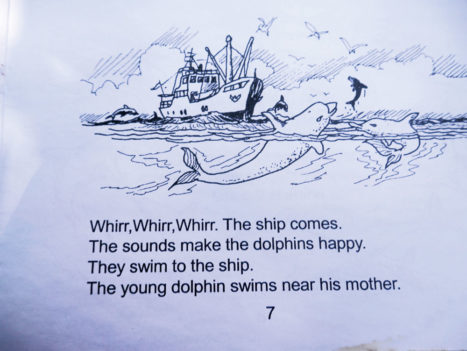
Lowry resident Minnie Simonet holds a baby in Kiribati.
Minnie Simonet fondly recalls her most memorable 4th of July. While many of her days as a Peace Corps volunteer in a small village in Kiribati were filled with work, “Early one morning, and my door was not yet opened, I heard someone call my name.” It was the village elder saying he knew how hard she worked and to take the day, July 4, off to spend with the other Peace Corps volunteers.
Simonet and her friend Mindy rode their bikes to the hut of a third volunteer, Chris, in Butaritari Village. “We get over to the hut . . . and think that we can’t be smelling coffee.” There was generally no coffee on the island, but her friend had saved a small package mailed by his mother.
When she returned to her village that evening, she saw an image that truly surprised her. The village people flew the American flag from a coconut tree in their honor. “We saw hanging from the coconut tree our flag and we, all three, were weeping. We hadn’t seen our flag since being there. No hot dogs, no beer, but we had coffee and there was our flag,” Simonet recalls. The flag raised to honor the Peace Corps volunteers on July 4, 2000 was the same one that flew over the island in 1943 during the World War II Battle of Butaritari.
————
Although largely unknown to Americans today, news from the Republic of Kiribati was front-page material 75 years ago. Back then, Kiribati’s 33 coral islands and 1.35 million square miles of South Pacific weren’t yet unified. But on those small islands, the United States faced the Japanese in some of the most brutal fighting in the early years of the Pacific War.

Simonet taught teachers in Kiribati to make books about subjects the children there understood as they learned to read.
In 1942, the island of Butaritari was the target of one of the earliest American raids against the Japanese, providing a much-needed moral boost early in the war. Later, in November of 1943, the Marines landed on the second largest island and what is Kiribati’s current capital, Tarawa. Coverage of the invasion resulted in a Pulitzer Prize winning photo in 1944 and the short film With the Marines at Tarawa, which won the 1945 Academy Award for best documentary short.
“During low tide you could see the [shot-down] Japanese planes in the water,” says Lowry resident, Simonet. “They loved you straight away because you were American.”
Kiribati, however, was known to be a hard Peace Corps posting and things were far from easy. Simonet, with over 30 years experience as an educator before joining up at the age of 61 was given her pick of assignments. “I’ll go wherever,” she said.
In Butaritari, Simonet got to work teaching English and teaching local teachers how to teach English. What she noticed right away was that the students were trying to learn from hand-me-down Australian workbooks—only the kids had never seen a lot of the things used as examples—big cars, supermarkets, etc. So Simonet had the teachers make their own books, illustrated with pictures that the kids understood: dolphins, fishing boats, sports and local foods. The program took off, and soon Simonet was traveling to Tarawa and instructing national administrators how to put together the little books.
When Simonet returned to Denver, she taught English as a Second Language to students at the Community College of Aurora for seven years. And her work as an educator in Butaritari continued too. The government took an interest in the books and they printed and distributed them on the islands. Simonet proudly keeps a copy of one of these newer books, along with early examples from her time there.
On the Fourth of July, as Simonet remembers her time in Butaritari, the people and children there can see a part of Simonet—in the books and in the people who learned from them.




minnie you are a jewel
I would like to read one of your books
wally